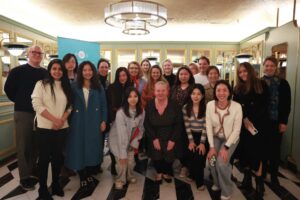
We had a full house last Tuesday, November 7th, when we hosted an informative panel of experts about China’s hottest industry: Ecommerce. During our event called 11/11 and the Universe of Chinese Ecommerce, we touched on the different shopping festivals in the West and in China; what do the astonishing sales numbers during 11.11 actually mean; what can be successful strategies to engage with Chinese consumers on such shopping festivals; as well as the role of third party players such as English speaking platforms and service providers.
The audience was so into the topic that they regretted not having a Questions and Answer session, which led to members of the audience discussing with the panel of experts for quite some time after the event was finished. Several attendees even offered to volunteer for IPWS and our future events and become active members of our community!

This event wouldn’t have been possible without our panel of experts Regina Zhang at OCheng, Jasmine Ma at Finnair and Jay Thornhill at Baopals, as well as our knowledgeable moderator Linna Zhao at MEC GroupM Agency. We were welcomed at the beautiful restaurant Maya, which reserved a cosy space for the panel discussion and following reception.

See some the evening’s key takeaways below:
Jasmine Ma, Finnair
“Double 11 is a good window to promote sales, at the same time it is a good chance to increase brand awareness due to huge traffic on different platforms. Do not involve too much in price war, discount is necessary but profit is more important than sales. Try to figure out own characters to offer more value added benefits to consumer.”
“Ali group created Double 11 but all platforms are organising promotions on Double 11 now. Understand your products and partners characters, different partners have different strategy, e.g. Alibaba is more price sensitive, JD has merchandise strengths, our own official website offer ancillary discount etc…”
“One key difference between China’s shopping events and Black Friday or Cyber Monday in the West is the reason for shopping. Black Friday and Cyber Monday are late November and they mark the beginning of Christmas shopping season, which has always been the busiest time for retail in the US and other western countries. So people are doing all this shopping because it’s time to buy gifts for Christmas. Traditional Chinese holidays aren’t as commercial as western holidays – no one talks about Spring Festival shopping. Instead, Chinese shopping festivals can happen any time of year, and they’re a celebration of shopping itself and Chinese shopping platforms. 11/11 is the ultimate “Treat yourself” day. JD has “618” for their June 18 anniversary, Suning has 818 for their August 18 anniversary, and VIPshop has 128 for their December 8 anniversary. So in China the shopping festivals stand on their own and can happen any time of year simply as an excuse for people to indulge. I think the cultural element is really interesting, as China has been thrust into consumer culture in recent years, disposable income has risen dramatically, and there have been huge leaps in consumer choice, technology and so on – so the shopping festivals feel like a celebration of shopping and in a way the progress China has made.
After years of development, the original lure of discounts has lost some of its appeal. Chinese shoppers have also begun to place more value on product quality and brand appeal. 80% of respondents in a Forbes poll said they now value quality over price with regard to Singles’ Day purchases. So Singles’ Day for Alibaba has gone from a one-day event into a weeks-long celebration with lead-up events from partner brands, technology roll-outs, interactive events like the Tmall “Catch the Cat” game and red envelope torch relay, the celebrity countdown gala, and more.
It’s hard for brands to stand out on 11/11 because when you look at Tmall and JD stores of major brands, you see mostly the same promotions – because they’re all following the protocols set by the platform. To differentiate, brands can do separate promotions on their own platforms and engage with the followers they have. So it’s really important for brands to gain followers throughout the year and then reward those followers in their own way during the shopping festivals. WeChat plays a huge role in marketing because of the power of sharing. A great example of that was a Uniqlo campaign called “Style Your Life” where the shoppers tried on clothes in stores stood in front of monitors to take pictures of themselves in cities around the world. The picture was then sent to their WeChat account where one third of people shared it on their Moments. The campaign was a huge success, with a 30% increase of sales for featured items, and their followers grew from 400,000 to over one million.
As for Baopals, this will be our second 11/11 and it’s the most important day of the year. Last 11/11 we did over 5x a typical day’s business in terms of sales volume, and this year we expect much more as our customers and expats in general are becoming more familiar with Singles’ Day. We’re excited to be able to bring China’s shopping festivals to a lot of expats who otherwise wouldn’t take part. For 11/11 we see larger shopping carts as people purchase appliances like TVs, computers, air purifiers, and so on. Our most popular categories are clothing, electronics, and household goods like bedding and kitchenware.
It’ll be a crazy day for out team, as we’re operating from midnight to midnight in different shifts. We’ll be on a livestream through CGTN (China Global Television Network) along with Alibaba and JD at 2am, so we’ll have plenty of energy drinks and coffee to help us stay awake for our most exciting day of the year.”

Susie Xu – Event Attendee
“This is my first time attending an IPWS event and I joined the membership right after, this said most of it. The speakers’ sharing motivated me to start thinking about the whole idea of 11.11 shopping festival which generated around ¥120.7Billion in 2016, in just one day.





























